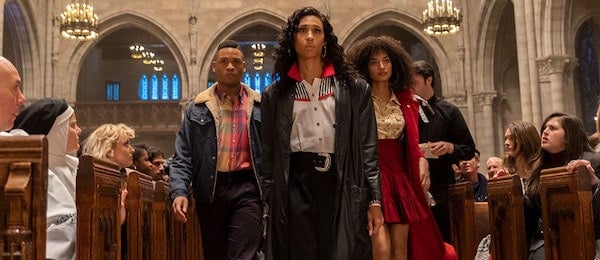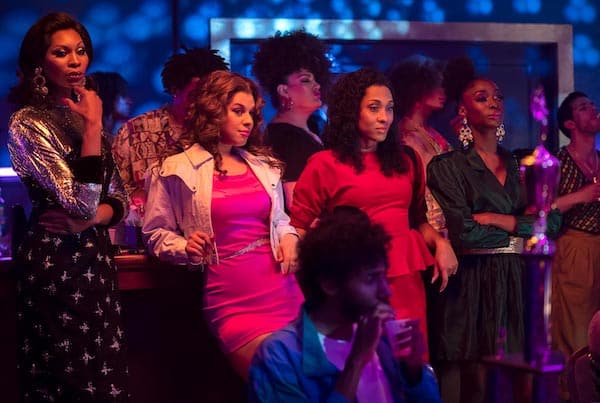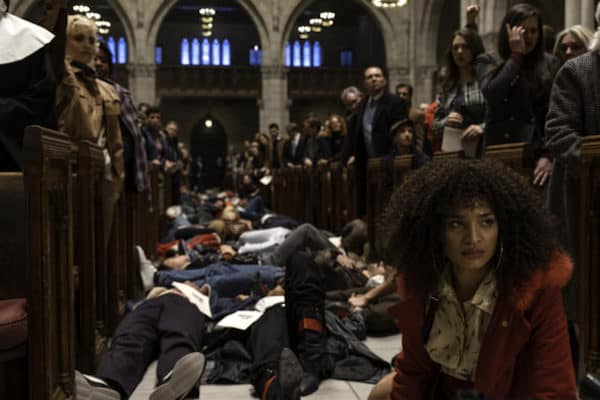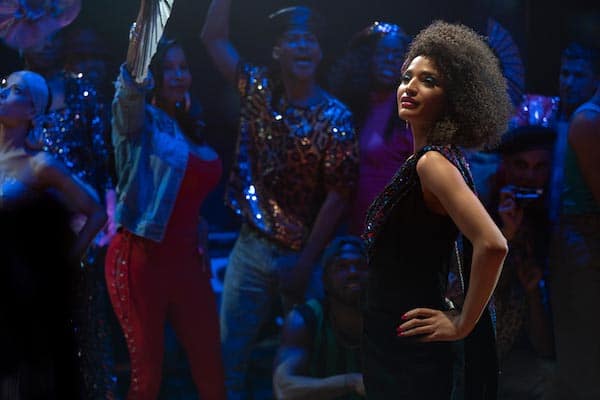
Coming off a bold, breathtaking and often devastating first season, the season two premiere of Pose on F/X delivered all the magic of its peerless debut.
Make no mistake, Pose is the most special series on television, and it's one of the strongest representations of queer people in contemporary media. Where else are we seeing stories about young, poor, trans and gay people of color told with such dignity, depth and hope? Season two is already masterfully blending the personal and political, unique and universal experiences and themes that resonate in the past and present day.
Last night's hour-plus premiere was overflowing with emotion. One of the hallmarks of Pose is its ability to showcase the beauty of the ballroom, the depths of despair as a community mourns loss after loss and a world that seems to stop at nothing to destroy them, all without losing sight of the humanity of its characters.
Much of the success can be attributed to the ensemble, starring the largest cast of trans actors ever on television. It cannot be overstated just how powerful the performances are from Indya Moore, Mj Rodriguez and Billy Porter. The entire cast is fabulous, but those three in particular make the women of Big Little Lies look absolutely amateur. (Sorry, Meryl.)
This season seems poised to push their characters even more to the forefront. It appears to have wisely pivoted from its initial focus on dancer Damon (Ryan Jamaal Swain), who served as the audience's proxy entering this world.
A larger spotlight for Porter is especially welcome. Having recently established himself as a red carpet icon, Porter's profile has been on the rise for some time, but his storyline is rich with moments of triumph, pain and passion. He would be wise to start clearing space for some trophies thanks to his work here.

The season begins in 1990. Madonna's “Vogue” is introducing ballroom culture to the mainstream, while Blanca (Rodriguez) and Pray Tell (Porter) visit a friend in a potter's field on New York's Hart Island. The sight of the mass grave full of plain pine boxes, separate for the those that died with HIV/AIDS, could not have stood in starker contrast to the bright, bold world of ballroom the show depicts so well. It was a staggering scene, and one that perfectly showcased the stakes at play without devolving into typical maudlin theatrics.
Both characters are HIV-positive, but approaching their fates in different ways. Pray is more angry, cynical. His relationship with a registered nurse, Judy (an expanded part for legend Sandra Bernhard) leads him to joining ACT UP, further contextualizing these characters in a very specific time. The writing and performances on Pose give these characters such rich emotional lives and meaningful relationships, these historical scene-setting moments feel fully lived-in and not, you know, like a Sasha Velour workroom mirror speech.
ACT UP's activism seems to be an important narrative thread this season. Most of the House of Evangelista joined Pray at the “Stop the Church” die-in at New York's St. Patrick's Cathedral. It's moments like this where having a queer/trans cast really matters. There's something about this scene that shakes viewers to the core. It's as if the actors — still, today, fighting for their rights, dignity and safety — are channelling all of that trauma, theirs and their queer ancestors'. There's a magic there that only a queer cast and crew could create.

Not every character is as engaged, of course. The over-the-top grand dame, Elektra (Dominique Jackson) isn't interested in joining the protest. Her absence from the act causes Pray to lash out at her at the ball following one of her flawless runways. It melds fantasy and reality on multiple levels; bringing the urgency of the AIDS Crisis to the ballroom floor fantasy world while dramatizing a conversation that continues to play out in various ways across the LGBTQ+ community.
Community and family continue to be important themes. Blanca's House of Evangelista appears to be thriving. The opportunity presented by Madonna's success (and her recent lab results' reported low T-cell count) is inspiring the house mother to seize the moment. Blanca is an optimist, but not foolish. Never forget hope is a survival mechanism, and she's surviving for her children. In some ways, her big ideas feel prescient, but in other ways, it seems like only a matter of time before the other heel drops.
Her choice to quit her job feels a lot like the latter. When her boss refuses to give her the time off to go to the protest, Blanca quits in a huff, vowing to open her own nail salon. It feels like an exceptionally short-sighted decision, especially when it appears Blanca is the primary breadwinner at the House of Evangelista. Plus, NYC storefronts don't come cheap or easy.
Luckily, her encouragement of Angel (Moore) seems like a much safer bet. After catching Angel hooking on the piers, she takes her to a modeling open call. Anyone with even one mostly working eyeball could see that Angel is a f*cking supermodel. I personally could watch Moore read a newspaper for a full 90 minutes and be utterly captivated. She reminds me of Angelina Jolie or Nyle DiMarco or Teyanna Taylor, someone whose beauty and grace far surpasses traditional, basic beauty standard nonsense. There's something otherworldly about her. The list of actors that can convey as much as Moore by doing so little is exceptionally short. She's an incredible talent, and she ruled every single scene she was in last night.

Of course, Moore is moved to the next round of callbacks, but she's warned that she needs more professional pictures. As always, there are blockades to keep queer/trans/people of color down, and this is just one small example of Angel's magnificent talent not being enough to succeed in this system.
In one of the series' most striking sequences, we see Angel truly turning it out for the camera. She's a natural. The joy on her face is nearly blinding, and the spark within her as she discovers her calling as a model nearly radiates off the damn screen.
It makes it all even more devastating when the photographer forces her to take sexual photos against her will, exposing herself in ways that make her profoundly uncomfortable and attack the very confidence she was enjoying moments ago. It's utterly crushing to watch. My heart breaks even thinking about the scene.
Later, Angel, Blanca and Papi pay the photog a visit to exact some revenge. They take the photos and the negatives, which seems like a win, but it feels like something that will come back to haunt them.
If this first episode is any indication of the style, stakes and subject matter of the season to come, I can't wait to see what's next.
What did you think of the episode?



